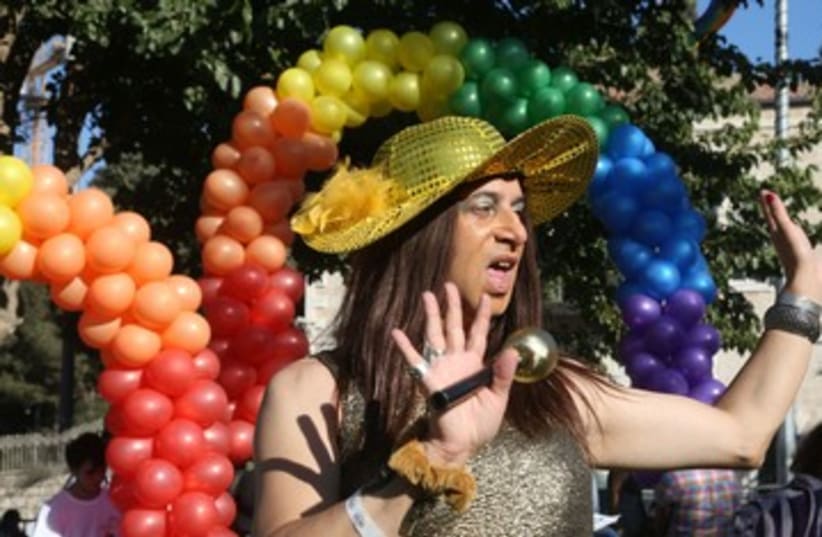There are already many public memorials to the hundreds of thousands of homosexual men who were persecuted and killed by the Nazi regime. In Holland, Germany, France, Austria, Spain and other European countries, the memorials are taken for granted. There are several in the United States – including in Alaska – as well as in Canada and Australia. Even Montevideo, Uruguay, unveiled one in 2005.Now there is one in Tel Aviv.Israel has joined the family of nations that have recognized that many minorities suffered terribly under Nazi rule, including the homosexual community, Jewish and otherwise.
Earlier this month, in the presence of a respectable and somber crowd that included several important dignitaries – among them German Ambassador Andreas Michaelis, Tel Aviv Mayor Ron Huldai and at least four MKs – the city unveiled a beautiful memorial to the homosexual men who suffered or were murdered during – and before – World War II in Germany.In his address, Huldai referred to the Holocaust of the Jewish people, but added that in the Nazi view, everyone “different [from] what they saw as the ideal and superior race – themselves – had to be eliminated,” and that included gay men.“The message of this memorial is that in Tel Aviv, we honor and respect everyone,” he continued.“Race, creed, religion, color, sex and gender identity are irrelevant. In Tel Aviv, we want to welcome one and all. This memorial will help teach these values to the next generation.”Michaelis became clearly choked up with emotion while delivering his speech, wiping a tear from his eye by the end of it. He mentioned the relative openness of the Weimar Republic, which was in power for 15 years before Germany succumbed to the Nazis in 1933, and the contrast with what followed. He spoke, too, of his youth in the 1960s.“I remember hearing the phrase ‘the 175ers’ to refer to homosexuals, but I didn’t understand the reference,” he recounted. “Only later did I learn that it was ordinance No. 175 of the German Penal Code that criminalized homosexuality [in men only]. The law was in effect in deeply homophobic Germany for over 100 years. Today Germany recognizes the awfulness of that period and accepts responsibility not only for the Jewish Holocaust, but for the gay holocaust as well.”The ambassador added that although monuments were an important visual symbol of tolerance, “actions speak louder than words or symbols. We need to act to rout out mindless preconceptions and ingrained intolerance.”Lengthy applause greeted the ambassador’s words.The new Tel Aviv memorial is gracious in its simplicity: an open-ended pink triangle with a brief explanatory plaque in Hebrew and English. Funded by city hall, it is located in Meir Park, just opposite the municipal community center for the lesbian, gay, bisexual and transgender (LGBT) community.Attorney Eran Lev planted the seeds of the memorial idea during his stint as a city councillor, and they took root in fertile ground. In his brief address to the gathering, Lev mentioned that the memorial was one of three important steps that the City of Tel Aviv had taken in recent years to bring the LGBT communities “out of the cold and into the fold.” The other two are the community center itself, and Beit Dror – a halfway house for LGBT youth with no other place to live, usually after their families have spurned them.Lev also gave credit to Prof. Moshe Zimmerman, a historian whose cooperation helped bring the project to fruition.Not everyone was happy about the memorial, however. A man walking his dog nearby made crude comments and vulgar gestures as he passed.Still, as one of the young men in the audience was overheard saying, “Who would have thought? Just a few short years ago, the LGBT community was roundly criticized for daring to hold a memorial service for gays slaughtered in Europe, on the same day as the official Holocaust Memorial Day in Israel. Now [there’s] this commemorative monument. Israel sure changes fast.”The writer is a former South African, a gay activist and the author of Flying Colors, in which he tells of his own coming-out experiences and of his 30 years of working as a flight attendant on El Al. He also established TEHILA, a self-help organization for parents and families of the LGBT community.Remembering the ‘175ers’
Israel has joined many other countries in dedicating a memorial to homosexual victims of the Holocaust.
